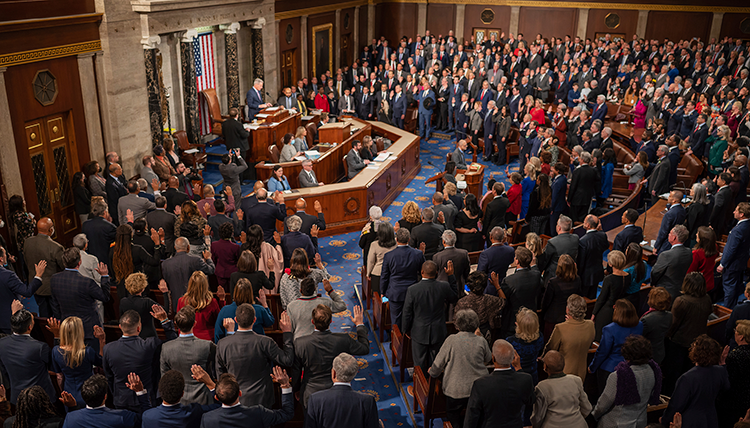Welcome to the 118th Congress

Rep. Kevin McCarthy, R-Calif., swears in new members of Congress in the House of Representatives after his win in the 15th ballot to become Speaker of the House. (Photo by Craig Hudson/Sipa USA)(Sipa via AP Images)
The 118th Congress began earlier this month with President Joseph R. Biden still in office and a divided government. After hard-fought midterm elections, the Democrats retained majority control in the Senate, but with a slim 51-to-49 margin that includes three Independent senators in the majority, two of whom will caucus with the Democrats. The new Senate was sworn in as scheduled on Jan. 3, and the Senate leaders remain the same.
In the House of Representatives, Republicans took majority control with 222 Republicans and 213 Democrats. Members of the House were not sworn in, though, until Jan. 7 after the Speaker of the House was finally elected. Unlike previous speakers elected on the first vote throughout the last 100 years, this year it took four days, 15 floor votes and multiple concessions to hardline conservatives before Speaker Kevin McCarthy was finally elected with the minimum votes required to win.
The chaos and confusion among House Republicans throughout these votes highlight the uncertainty of the next two years as the 118th Congress gets underway. A new generation of leaders now occupying all three of the top House Democratic positions will further complicate any progress.
Narrow margins in each chamber will mean every vote counts as party leaders try to advance their legislative agendas. A Republican House will clash on most issues with the Democratic Senate, with bitter fights expected over even basic functions, including funding the government.
Massive turnouts during the midterm elections and close election results revealed that the American people are dissatisfied with their elected officials, and both parties will need to dial back the rhetoric and improve the quality of potential candidates to restore public confidence in our system of government in advance of the looming 2024 presidential election cycle.
Political unity and bipartisanship matter more than ever, but as we have already seen at the beginning of this 118th Congress, they will be difficult to achieve. A new era of gridlocked government in Washington, with bitter stalemates over legislation and critical fiscal issues, is expected.
Against this uncertain backdrop, our Governmental Affairs team will continue to communicate with the administration, new and returning members of Congress, and agency officials to advocate for ABA legislative priorities and on issues important to the legal profession. The ABA Board of Governors will vote on the association’s priorities for this new two-year Congress on Feb. 3rd at the 2023 ABA Midyear Meeting, and the Governmental Affairs team will post them online.
What can you do to help?
Get involved. While the ABA focuses its advocacy primarily at the national level, “all politics is local,” and members of Congress need to hear from their constituents at the state and local level.
The ABA Governmental Affairs team is already working with the 118th Congress, renewing existing relationships and building new ones. Now is a great time for ABA members and members of the legal profession to do the same. Visit our Grassroots Action Center to access tools focused on helping you get to know the new Congress—bios for the freshman members of the House and new senators, lists of lawyers and veterans serving in Congress, tips for contacting your elected officials, and more.
While on the site, join our Grassroots Action Team and let us know about relationships you might have with members of Congress or their staff.
Check out the ABA Governmental Affairs and National Association of Bar Executives joint publication All Politics is Local. It has great tips from ABA and state and local bar advocates for building congressional relationships, developing lobby plans, creating engagement (and photo) opportunities benefiting members and advocates, and more.
Have questions or need help finding anything? Just ask a member of the GAO team or call us at 202-662-1760.
The ABA recognizes that government funding, immigration reforms affecting our borders, and potential investigations will permeate initial legislative and governmental efforts during the 118th. However, we will monitor developments to identify opportunities to advocate on policy issues important to our ABA members and the legal profession.
Sign up for our monthly Washington Letter (a digital newsletter) or follow us @ABA Grassroots on Twitter and LinkedIn to stay abreast of legislative and governmental developments as they happen.
ABA advocacy is a benefit for ABA members and others who want to be heard in Washington, D.C. In the 118th Congress, the ABA will continue its vigorous efforts to protect the profession, the courts, individual liberty, civil rights and the rule of law. And we will do so with commitment and enthusiasm.
Holly Cook is the director of the ABA’s Governmental Affairs Office in Washington, D.C. This report discusses advocacy efforts by the ABA relating to issues being addressed by Congress and the executive branch of the U.S. government.



